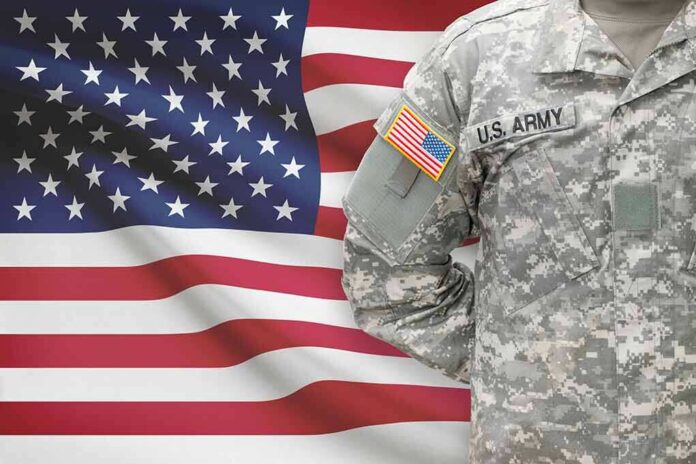
President Trump pardons 1st Lt. Mark Bashaw, vindicating the officer who sacrificed his 17-year military career by refusing to comply with what he saw as unconstitutional COVID-19 mandates.
Key Takeaways
- President Trump pardoned former 1st Lt. Mark Bashaw, who was court-martialed in 2022 for refusing to comply with COVID-19 safety orders, making him the first known service member to face court-martial over such violations.
- Bashaw was discharged from the Army after 17 years of service despite receiving no punishment from the military judge, losing his career for standing by his principles.
- His case was prosecuted by Eugene Vindman, brother of Alexander Vindman, who later publicly celebrated Bashaw’s conviction before pursuing a political career.
- Trump’s pardon removes Bashaw’s federal conviction record, eliminating potential barriers to future employment opportunities and restoring his reputation.
- The Pentagon dropped the military COVID-19 vaccination mandate in 2023, and Trump issued an executive order offering incentives for service members who were separated to return.
Standing on Principle: Bashaw’s Refusal and Court-Martial
In 2022, then-Army 1st Lt. Mark Bashaw found himself at a crossroads that would define his military career. After 17 years of honorable service, Bashaw was faced with complying with COVID-19 mandates that he believed violated his constitutional rights and religious beliefs, or standing firm on his principles. He chose the latter, refusing to telework, submit to COVID-19 testing, and wear a mask indoors. His decision led to a historic court-martial, making him the first service member to be tried for violations of COVID-19 safety protocols.
Despite being found guilty, the military judge assigned to his case declined to issue any punishment. Nevertheless, the conviction itself carried significant weight, and Bashaw was discharged from the Army in 2023, losing his career and the opportunity to reach full retirement after nearly two decades of service. The conviction also threatened to follow him into civilian life, potentially limiting his future employment opportunities.
“I just received a presidential pardon from President Donald J. Trump. I am humbled, grateful, and ready to continue fighting for truth and justice in this great nation,” Mark Bashaw said following the announcement of his pardon.
The Vindman Connection and Political Fallout
Adding a layer of political complexity to Bashaw’s case was the involvement of Eugene Vindman as the prosecutor. Vindman, the twin brother of Alexander Vindman who played a key role in President Trump’s first impeachment proceedings, took to social media after securing Bashaw’s conviction to celebrate the verdict. This public display raised questions about whether Bashaw’s prosecution was motivated by genuine concerns for military discipline or political vendettas. Following the trial, Eugene Vindman transitioned from his military role to pursue a political career.
The handling of Bashaw’s case exemplifies the broader politicization of COVID-19 policies within the military during the pandemic. Approximately 8,200 service members were separated from military service for refusing the COVID-19 vaccine, with many citing religious objections similar to Bashaw’s. Despite the Pentagon’s eventual decision to drop the vaccination mandate in 2023 following congressional legislation, only about 100 service members had returned to active duty by April of that year.
“A court-martial conviction carries lifelong collateral consequences of a federal conviction, beyond punishment imposed by the court,” said Amburr Reese, military legal expert.
Presidential Pardon: Restoration of Honor and Reputation
President Trump’s decision to pardon Bashaw represents a significant vindication for the former Army officer. The pardon removes the federal conviction from Bashaw’s record, eliminating potential barriers to future employment opportunities and restoring his reputation. More broadly, the pardon sends a powerful message about the value of standing on principle, even at great personal cost. It underscores the administration’s commitment to addressing what many conservatives view as overreach during the pandemic response.
“Some examples may include social consequences and difficulty in obtaining future employment, as criminal convictions are generally public information and frequently reported in federal and state criminal and licensing databases,” said Amburr Reese, military legal expert.
In January, President Trump issued an executive order offering incentives, including the possibility of back pay, for service members who were separated due to COVID-19 vaccine refusal to return to duty. This move, combined with Bashaw’s pardon, reflects the administration’s efforts to right what many conservatives consider to be injustices perpetrated against military personnel who stood by their convictions during the pandemic. The Bashaw pardon stands as a powerful affirmation of the administration’s support for military members who maintain their integrity and ethical standards, even when facing institutional pressure to conform.












